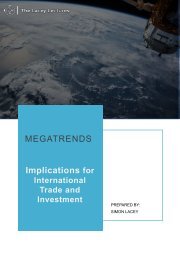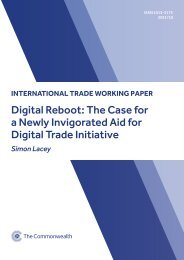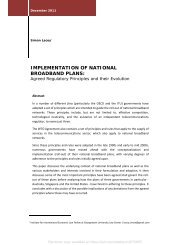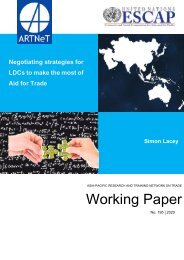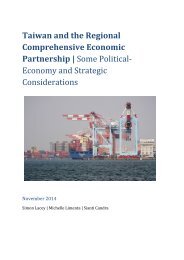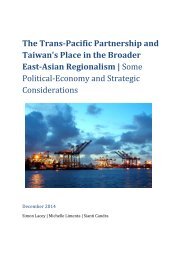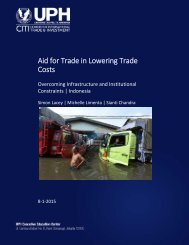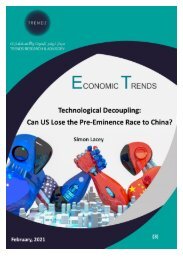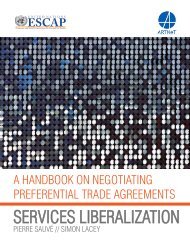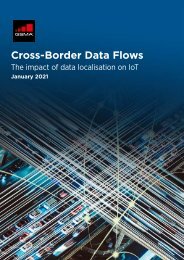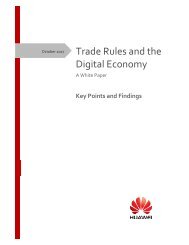Life after Doha: Some reflections in the run up to the 9th WTO Ministerial Conference on Bali
This is a book chapter that I wrote for an edited volume commissioned by the World Trade Institute in Berne, University Pelita Harapan and the Economic Research Institute for ASEAN and East Asia (ERIA), both in Jakarta. My chapter discusses how the multilateral trading system came to become intractibly bogged down in the Doha Round and argues that the WTO is still the best organization the world has for tacking a number of increasingly pressing issues. The book in its entirety can be viewed and downloaded at: https://www.eria.org/publications/the-road-to-bali-eria-perspectives-on-the-wto-ministerial-and-asian-integration/
This is a book chapter that I wrote for an edited volume commissioned by the World Trade Institute in Berne, University Pelita Harapan and the Economic Research Institute for ASEAN and East Asia (ERIA), both in Jakarta.
My chapter discusses how the multilateral trading system came to become intractibly bogged down in the Doha Round and argues that the WTO is still the best organization the world has for tacking a number of increasingly pressing issues.
The book in its entirety can be viewed and downloaded at: https://www.eria.org/publications/the-road-to-bali-eria-perspectives-on-the-wto-ministerial-and-asian-integration/
- No tags were found...
You also want an ePaper? Increase the reach of your titles
YUMPU automatically turns print PDFs into web optimized ePapers that Google loves.
<str<strong>on</strong>g>Life</str<strong>on</strong>g> <str<strong>on</strong>g>after</str<strong>on</strong>g> <str<strong>on</strong>g>Doha</str<strong>on</strong>g> | <br />
would have <str<strong>on</strong>g>to</str<strong>on</strong>g> be subsidies. After all, <str<strong>on</strong>g>the</str<strong>on</strong>g>re's no reas<strong>on</strong> <str<strong>on</strong>g>to</str<strong>on</strong>g> negotiate reducti<strong>on</strong>s <str<strong>on</strong>g>in</str<strong>on</strong>g> subsidies vis-à-‐vis<br />
a s<str<strong>on</strong>g>in</str<strong>on</strong>g>gle trad<str<strong>on</strong>g>in</str<strong>on</strong>g>g partner and <str<strong>on</strong>g>to</str<strong>on</strong>g> make difficult political-‐ec<strong>on</strong>omy cuts <str<strong>on</strong>g>to</str<strong>on</strong>g> such programs <br />
when <str<strong>on</strong>g>the</str<strong>on</strong>g>y will ultimately do little more than improve <str<strong>on</strong>g>the</str<strong>on</strong>g> market access of ano<str<strong>on</strong>g>the</str<strong>on</strong>g>r subsidiz<str<strong>on</strong>g>in</str<strong>on</strong>g>g <br />
country not party <str<strong>on</strong>g>to</str<strong>on</strong>g> <str<strong>on</strong>g>the</str<strong>on</strong>g> same reducti<strong>on</strong> commitments. The same is arguably true for rules <strong>on</strong> <br />
<str<strong>on</strong>g>in</str<strong>on</strong>g>tellectual property rights, prudential regulati<strong>on</strong>s, currency manipulati<strong>on</strong>, trade-‐related <br />
envir<strong>on</strong>mental measures and myriad o<str<strong>on</strong>g>the</str<strong>on</strong>g>r ec<strong>on</strong>omic policy areas that are susceptible <str<strong>on</strong>g>to</str<strong>on</strong>g> <br />
<str<strong>on</strong>g>in</str<strong>on</strong>g>ternati<strong>on</strong>al arbitrage as ec<strong>on</strong>omic ac<str<strong>on</strong>g>to</str<strong>on</strong>g>rs seek out jurisdicti<strong>on</strong>s with <str<strong>on</strong>g>the</str<strong>on</strong>g> lowest possible <br />
compliance costs. On issues such as <str<strong>on</strong>g>the</str<strong>on</strong>g>se, we need an <str<strong>on</strong>g>in</str<strong>on</strong>g>ternati<strong>on</strong>al organizati<strong>on</strong> that can act <br />
as a forum for negotiati<strong>on</strong>s that delivers enforceable outcomes, and we are <str<strong>on</strong>g>in</str<strong>on</strong>g> fact lucky <str<strong>on</strong>g>to</str<strong>on</strong>g> <br />
already have <strong>on</strong>e <str<strong>on</strong>g>in</str<strong>on</strong>g> <str<strong>on</strong>g>the</str<strong>on</strong>g> form of <str<strong>on</strong>g>the</str<strong>on</strong>g> <str<strong>on</strong>g>WTO</str<strong>on</strong>g> (at least for some of <str<strong>on</strong>g>the</str<strong>on</strong>g>se issues). <br />
F<str<strong>on</strong>g>in</str<strong>on</strong>g>ally, <str<strong>on</strong>g>the</str<strong>on</strong>g> th<str<strong>on</strong>g>in</str<strong>on</strong>g>g that <str<strong>on</strong>g>the</str<strong>on</strong>g> <str<strong>on</strong>g>WTO</str<strong>on</strong>g> does well is balanc<str<strong>on</strong>g>in</str<strong>on</strong>g>g out (<str<strong>on</strong>g>to</str<strong>on</strong>g> an admittedly limited albeit very <br />
real extent) <str<strong>on</strong>g>the</str<strong>on</strong>g> power asymmetries that naturally arise when big, ec<strong>on</strong>omically powerful and <br />
well-‐organized countries come <str<strong>on</strong>g>to</str<strong>on</strong>g> <str<strong>on</strong>g>the</str<strong>on</strong>g> same negotiat<str<strong>on</strong>g>in</str<strong>on</strong>g>g table as small, ec<strong>on</strong>omically weaker and <br />
less well-‐organized countries. Th<str<strong>on</strong>g>in</str<strong>on</strong>g>k of <str<strong>on</strong>g>the</str<strong>on</strong>g> miss-‐match <str<strong>on</strong>g>in</str<strong>on</strong>g> ec<strong>on</strong>omic strength and trade policy <br />
expertise that is at play when a develop<str<strong>on</strong>g>in</str<strong>on</strong>g>g country like <str<strong>on</strong>g>the</str<strong>on</strong>g> Philipp<str<strong>on</strong>g>in</str<strong>on</strong>g>es negotiates an ec<strong>on</strong>omic <br />
partnership agreement with Japan, or Columbia negotiates an FTA with <str<strong>on</strong>g>the</str<strong>on</strong>g> Unites States. It is <br />
arguably power imbalances such as <str<strong>on</strong>g>the</str<strong>on</strong>g>se that allow <str<strong>on</strong>g>the</str<strong>on</strong>g> EU <str<strong>on</strong>g>to</str<strong>on</strong>g> get away with c<strong>on</strong>clud<str<strong>on</strong>g>in</str<strong>on</strong>g>g <br />
preferential trad<str<strong>on</strong>g>in</str<strong>on</strong>g>g arrangements with many smaller trad<str<strong>on</strong>g>in</str<strong>on</strong>g>g partners that explicitly carve out <br />
important areas like c<strong>on</strong>t<str<strong>on</strong>g>in</str<strong>on</strong>g>gency protecti<strong>on</strong> from <str<strong>on</strong>g>the</str<strong>on</strong>g> dispute settlement provisi<strong>on</strong>s of <str<strong>on</strong>g>the</str<strong>on</strong>g>se <br />
agreements. The "vic<str<strong>on</strong>g>to</str<strong>on</strong>g>ry" that develop<str<strong>on</strong>g>in</str<strong>on</strong>g>g countries scored over <str<strong>on</strong>g>the</str<strong>on</strong>g> EU at Cancun, ultimately <br />
forc<str<strong>on</strong>g>in</str<strong>on</strong>g>g Pascal Lamy <str<strong>on</strong>g>to</str<strong>on</strong>g> aband<strong>on</strong> any of <str<strong>on</strong>g>the</str<strong>on</strong>g> S<str<strong>on</strong>g>in</str<strong>on</strong>g>gapore Issues except <str<strong>on</strong>g>the</str<strong>on</strong>g> <strong>on</strong>e that develop<str<strong>on</strong>g>in</str<strong>on</strong>g>g <br />
countries were favourable <str<strong>on</strong>g>to</str<strong>on</strong>g> would be unth<str<strong>on</strong>g>in</str<strong>on</strong>g>kable <str<strong>on</strong>g>in</str<strong>on</strong>g> a more limited sett<str<strong>on</strong>g>in</str<strong>on</strong>g>g where <strong>on</strong>e or a <br />
handful of develop<str<strong>on</strong>g>in</str<strong>on</strong>g>g countries face off aga<str<strong>on</strong>g>in</str<strong>on</strong>g>st <str<strong>on</strong>g>the</str<strong>on</strong>g> EU as <str<strong>on</strong>g>the</str<strong>on</strong>g> sole hegem<strong>on</strong> <str<strong>on</strong>g>in</str<strong>on</strong>g> <str<strong>on</strong>g>the</str<strong>on</strong>g> room. The <br />
ability of <str<strong>on</strong>g>the</str<strong>on</strong>g> <str<strong>on</strong>g>WTO</str<strong>on</strong>g> <str<strong>on</strong>g>to</str<strong>on</strong>g> create a more level play<str<strong>on</strong>g>in</str<strong>on</strong>g>g field (an admittedly tired and over-‐used cliché) <br />
for developed and develop<str<strong>on</strong>g>in</str<strong>on</strong>g>g countries has been analysed and documented <str<strong>on</strong>g>in</str<strong>on</strong>g> a number of <br />
articles <str<strong>on</strong>g>in</str<strong>on</strong>g>clud<str<strong>on</strong>g>in</str<strong>on</strong>g>g a very <str<strong>on</strong>g>in</str<strong>on</strong>g>sightful <strong>on</strong>e by Crist<str<strong>on</strong>g>in</str<strong>on</strong>g>a Davis of Pr<str<strong>on</strong>g>in</str<strong>on</strong>g>ce<str<strong>on</strong>g>to</str<strong>on</strong>g>n <str<strong>on</strong>g>in</str<strong>on</strong>g> 2005, that compares <str<strong>on</strong>g>the</str<strong>on</strong>g> <br />
differences <str<strong>on</strong>g>in</str<strong>on</strong>g> outcomes between Vietnamese catfish exporters (when Vietnam was not yet <str<strong>on</strong>g>in</str<strong>on</strong>g> <br />
<str<strong>on</strong>g>the</str<strong>on</strong>g> <str<strong>on</strong>g>WTO</str<strong>on</strong>g>) and Peruvian exporters of sard<str<strong>on</strong>g>in</str<strong>on</strong>g>es when faced with trade barriers <str<strong>on</strong>g>in</str<strong>on</strong>g> rich-‐country <br />
export markets. 78 The <str<strong>on</strong>g>WTO</str<strong>on</strong>g> undoubtedly still has its uses <str<strong>on</strong>g>in</str<strong>on</strong>g> this respect and we cannot afford <str<strong>on</strong>g>to</str<strong>on</strong>g> <br />
do without it. <br />
78 Christ<str<strong>on</strong>g>in</str<strong>on</strong>g>a l. Davis, Do <str<strong>on</strong>g>WTO</str<strong>on</strong>g> rules create a level play<str<strong>on</strong>g>in</str<strong>on</strong>g>g field? Less<strong>on</strong>s from <str<strong>on</strong>g>the</str<strong>on</strong>g> experience of Peru and Vietnam, <str<strong>on</strong>g>in</str<strong>on</strong>g>: John S. <br />
Odell (ed.), Negotiat<str<strong>on</strong>g>in</str<strong>on</strong>g>g Trade, Develop<str<strong>on</strong>g>in</str<strong>on</strong>g>g Countries <str<strong>on</strong>g>in</str<strong>on</strong>g> <str<strong>on</strong>g>the</str<strong>on</strong>g> <str<strong>on</strong>g>WTO</str<strong>on</strong>g> and NAFTA, Cambridge University Press, 2006, pp. 219 -‐ 256. <br />
27




